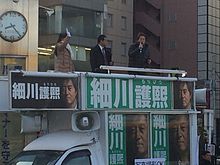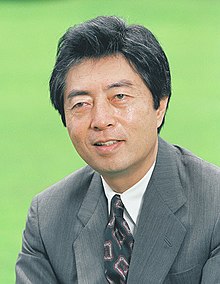Morihiro Hosokawa
Morihiro Hosokawa ( Japanese 細 川 護 煕 , Hosokawa Morihiro ; born January 14, 1938 in Tokyo ) is a former Japanese politician (non-party → LDP → JNP → NFP → Five → GGP → DPJ → non-party) and was from 1971 to 1993 with one interruption (1983–1992) Member of the Upper House of the Japanese Parliament and from 1993 to 1998 in the Lower House . From August 1993 to April 1994 he was the 79th Prime Minister of Japan and, with his coalition cabinet, led the first non-LDP government since 1955.
Early political career
Hosokawa was born on January 14, 1938, the son of the politician Hosokawa Morisada .
In 1961, Hosokawa graduated from Sophia University with a Bachelor of Laws . After working for the Asahi Shimbun newspaper for several years , he was elected to the House of Lords of Japan in 1971 as a member of the LDP for Kumamoto Prefecture .
After two terms in the Japanese Parliament , he left it in 1983 to become governor of Kumamoto Prefecture , which he remained until 1991.
In 1992 he declared that he could no longer stand the corruption in the LDP and resigned to found the short-lived reformist New Japan Party ( 日本 新 党 , Nihon Shintō (JNP)).
prime minister
In the summer of 1993, an event occurred that very few would have predicted a year earlier: the LDP lost a majority in parliament for the first time in 38 years and was replaced by an eight-party coalition government that implemented a series of social, political and economic reforms promised. Apart from the Japanese Communist Party , the coalition was supported by all previous opposition parties, including the newly formed JNP, the Socialist Party , the Renewal Party , Kōmeitō , the Social Democrats and the New Sakigake Party . Hosokawa, one of the key players in the formation of the coalition, was elected as the new prime minister. His cabinet was the youngest in 20 years, with an average age of 59.4 years.
One of the new Prime Minister's first acts was to say what no other Japanese leader, including the Emperor, had said in 48 years. Addressing the annual World War II commemoration ceremony on August 15, 1993 , he publicly acknowledged that World War II was "a war of aggression, a false war" and expressed responsibility and compassion for its victims in Japan its Asian neighbors and the rest of the world.
On March 19, 1994, he visited China . The two governments signed an agreement on environmental protection .
Although his coalition pushed its electoral reform laws, which had already been the subject of protracted national debate, through the legislative process in 1994, Hosokawa's time as prime minister was short. On allegations that he misused personal funds in the 1980s, he was forced to resign later that year, just eight months after taking office. After his resignation, the coalition was led by the President of the Shinseito, Tsutomu Hata .
Withdrawal from political life
Hosokawa joined the Shinshintō in 1996 and joined the Democratic Party of Japan (DPJ) in 1998 . In May of the same year he retired from politics.
After that he dealt with pottery . His works have been exhibited in Japan and Europe . He is also an advisor to The Japan Times newspaper .
Candidate for governor of Tokyo prefecture

On January 14, 2014, at the age of 75, despite his previous retirement from politics, Hosokawa announced his candidacy for election as governor of Tokyo Prefecture on February 9, 2014 . His candidacy was supported by former Prime Minister Jun'ichirō Koizumi , who is campaigning for a nuclear phase-out together with Hosokawa , and without a formal election recommendation from the Democratic Party , Yui no Tō and Seikatsu no Tō . The Tokyo Metropolitan holds 1.2% percent of the shares of Tepco (September 2013), making it the fourth-largest shareholder. Hosokawa was finally defeated by the former health minister Yōichi Masuzoe and landed in third place behind Kenji Utsunomiya (Masuzoe 43.4%; Utsunomiya 20.2%; Hosokawa 19.6%).
family
Hosokawa currently serves as the (18th) chief of the Hosokawa clan , as a member of which he has many family ties to personalities in Japanese history. By patrilinearitäre succession of Hosokawa and their Genji he -Abstammung a descendant of Emperor Seiwas (and thus, theoretically, Emperor Jimmu , the mythological founder of the state of Japan), and thus with the Japanese imperial family (related especially since his brother with a daughter of Prince Takahito Mikasa married is). Other ancestors of Hosokawa include Hosokawa Fujitaka or Akechi Mitsuhide . In addition, he is on his mother's side a member of the Konoe family , which in turn descends from the Fujiwara clan . B. is also a descendant of Tokugawa Ienaris or Sanjō Sanetomis . His current best-known ancestor is probably the former Prime Minister and founder of the Taisei Yokusankai , Konoe Fumimaro , whose government made a significant contribution to the United States' entry into the Pacific War with the introduction of the Greater East Asian Prosperity Sphere.
Family tree (selection)
| Emperor Meiji | Konoe Atsumaro | Hosokawa Morihisa | |||||||||||||||||||||||||||||||||||||||||||||||||||||||
| Emperor Taishō | Konoe Fumimaro | Hosokawa Moritatsu | |||||||||||||||||||||||||||||||||||||||||||||||||||||||
| Takahito from Mikasa | Yuriko | Yoshiko | Hosokawa Morisada | ||||||||||||||||||||||||||||||||||||||||||||||||||||||
| Tomohito from Mikasa | Nobuko | Asō Tarō | Yasuko | Konoe Tadateru | Hosokawa Morihiro | Kayoko | |||||||||||||||||||||||||||||||||||||||||||||||||||
| Akiko | Yōko | Konoe Tadahiro | Hosokawa Morimitsu | Satoko | Yūko | ||||||||||||||||||||||||||||||||||||||||||||||||||||
Individual evidence
- ↑ [Koizumi cabinet has record no. Of women, non-Diet members Kyodo, April 30, 2001: Koizumi cabinet has record no. Of women, non-Diet members.]
- ↑ 都 知事 選 告示 、 15 新人 届 け 出 = 原 発 ・ 防災 争 点 . In: Jiji Tsūshin . January 23, 2014. Retrieved January 23, 2014 (Japanese).
- ↑ 都 知事 選 、 脱 原 発 が 争 点 に 細 川 ・ 舛 添 氏 が 立 候補 表明 ( Japanese ) Asahi Shimbun . Retrieved January 15, 2014.
Web links
- Political address to the 127th session of Parliament, 23 August 1993
- Political address to the 128th session of Parliament, September 21, 1993
- Political address to the 129th session of Parliament, March 4, 1994
| personal data | |
|---|---|
| SURNAME | Hosokawa, Morihiro |
| ALTERNATIVE NAMES | 細 川 護 煕 (Japanese) |
| BRIEF DESCRIPTION | 79th Japanese Prime Minister |
| DATE OF BIRTH | January 14, 1938 |
| PLACE OF BIRTH | Tokyo |

